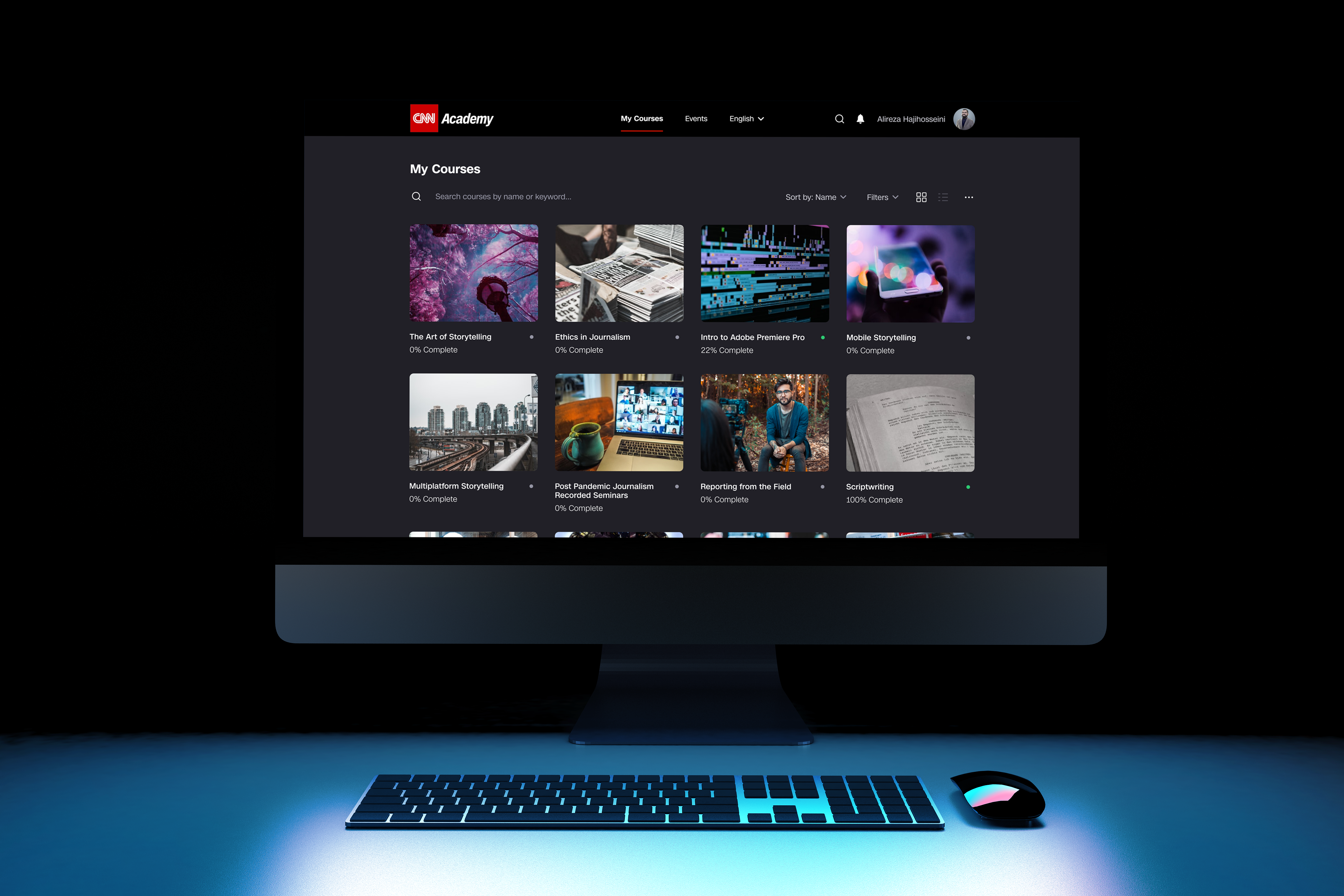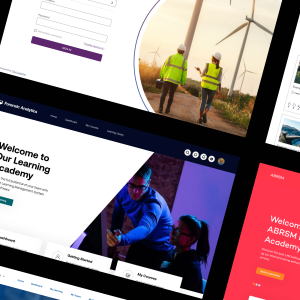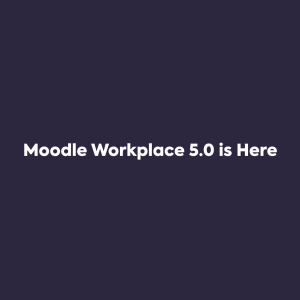Moodle has been a trusted name in the online learning space for over two decades. With its open-source architecture and robust features, the world’s most popular open-source LMS has empowered countless organisations to deliver effective online training.
Having become the go-to solution for educational establishments from schools to universities, Moodle soon noticed a growing demand from business customers, as organisations began to see the value of taking their L&D strategy online. As a result, in 2019, Moodle Workplace was launched — a specialised version of the original Moodle LMS platform aimed primarily at the corporate training market.
So what does that mean for organisations starting out on their online learning journey? Should you choose the open-source flexibility of Moodle LMS or the specialised tools and features of Moodle Workplace?
In this guide, we’ll help answer that question — exploring the key differences between the two Moodle platforms and helping you determine which platform best suits your organisation’s needs.
Moodle LMS vs Moodle Workplace Overview
Before diving into the specifics, let’s take a quick look at each platform:
Moodle LMS has long been the first choice for many organisations due to its flexibility, scalability, and extensive community support.
It’s a versatile open-source learning management system that offers a wide range of features and customisation options — widely used by educational institutions and businesses of all sizes.
Featuring a vast library of plugins and themes, Moodle LMS can be tailored to meet the unique needs of any organisation, from small businesses to large enterprises.
As a specialist platform, Moodle Workplace elevates the core functionality of Moodle LMS to new heights, addressing the specific challenges faced by businesses in managing and delivering training programs.
It’s a comprehensive corporate training solution built on the Moodle platform and designed to meet the complex needs of modern L&D departments — with workplace-specific features, multi-tenancy capabilities, and enhanced security.
A focus on compliance, automation, and data-driven insights makes Moodle Workplace a powerful tool for organisations looking to streamline their training processes and improve employee performance at an individual and group level.
What are the key differences between Moodle LMS and Moodle Workplace?
Although both platforms share the same core Moodle DNA and are developed by the same company — certified B Corp Moodle Pty Ltd — there are several key differences that set them apart:
2. Customisation and Flexibility
Moodle LMS:
Extensive customisation options due to its open-source nature, allowing organisations to tailor the platform to their specific needs.
Moodle LMS offers a high degree of flexibility, enabling organisations to customise the look and feel of their learning environment, create custom plugins, and integrate with external tools and systems.
This level of customisation allows organisations to create a unique learning experience that aligns with their brand and training objectives.
Moodle Workplace
Also customisable, but includes advanced features designed specifically for corporate environments, streamlining the configuration process.
Moodle Workplace builds upon the customisation capabilities of Moodle LMS, offering a range of pre-built features and integrations that are tailored to the needs of corporate training.
These include advanced reporting, compliance management, and multi-tenancy support, which help organisations quickly set up and manage their training programs without extensive configuration.
1. Target Audience
Moodle LMS
Best suited for organisations with simpler training requirements, but also adaptable for larger businesses seeking a customisable solution.
Moodle LMS is an excellent choice for educational institutions, non-profits, and small to medium-sized businesses that need an affordable, reliable and flexible platform to deliver online courses, assessments, and collaborative learning experiences.
With a user-friendly interface and extensive community support, it’s accessible to organisations with varying levels of technical expertise.
Moodle Workplace
Perfect for organisations with complex training requirements, offering advanced features and multi-tenancy capabilities.
Moodle Workplace is purpose-designed to cater to the requirements of large corporations, government agencies, and complex enterprises with diverse training needs across multiple departments or business units.
Advanced features, such as dynamic rules, automated workflows, organisational hierarchies, and advanced reporting, make it ideal for managing complex training programs at scale.
3. Reporting and Analytics
Moodle LMS
Offers a range of reporting tools to track user progress and course completion rates, with some ability to develop custom reports.
Moodle LMS provides administrators with insights into learner engagement, assessment results, and overall course performance. These reports can be used to identify areas for improvement and optimise users’ learning experiences. Custom reporting is possible, although it may require some coding knowledge to develop more complex reports.
Moodle Workplace
Features an advanced report builder with analytics, offering more detailed performance tracking across multiple departments and tenants.
Moodle Workplace features more advanced reporting and analytics, providing organisations with granular insights into employee performance, skill gaps, and training effectiveness. The advanced report builder allows administrators to easily create custom reports and dashboards, enabling data-driven decision-making and continuous improvement of training programs.
4. Dynamic Rules and Automated Workflows
Moodle LMS
Supports automation capabilities through plugins and extensions, enabling organisations to streamline learning and development processes.
Moodle LMS offers a range of automation tools, such as course completion tracking, certificate generation, and user enrollment management. These features help reduce the administrative workload and ensure a smooth learning experience for users.
Moodle Workplace
Comes with built-in dynamic rules and automated workflows, allowing for more efficient management of complex training programs.
Moodle Workplace takes automation to the next level, offering a comprehensive set of tools for managing training programs at scale. Dynamic rules allow administrators to set up automated actions based on specific triggers, such as user enrollment, course completion, or job role changes. Automated workflows streamline processes such as course assignments, notifications, and certification, ensuring that training programs run smoothly and efficiently.
5. Integration and Scalability
Moodle LMS
Supports integration with a wide range of tools and platforms, making it adaptable to different organisational setups.
Moodle LMS can be integrated with a wide range of third-party tools, such as student information systems, video conferencing platforms, and content management systems. This flexibility allows organisations to create a seamless learning ecosystem that fits their existing technology stack.
Moodle Workplace
Designed with scalability in mind, offering multi-tenancy capabilities and seamless integration with popular business tools and platforms.
Moodle Workplace is built to handle the complex needs of large organisations — including multi-tenancy support, which allows multiple departments or business units to manage their training programs independently within a single platform instance.
Its advanced integration capabilities ensure that Moodle Workplace can be seamlessly integrated with an organisation’s existing HR, CRM, and other business-critical systems without additional development.
6. Compliance and Certifications
Moodle LMS
Supports general compliance training and certifications through custom setups and configurations.
Moodle LMS can be used to deliver compliance training and track employee certifications, but it may require additional customisation and setup to meet specific regulatory requirements.
Moodle Workplace
Offers robust compliance and certification management features out-of-the-box, ensuring organisations can easily meet regulatory requirements.
Moodle Workplace includes built-in features for managing compliance training, such as automated course assignments, expiration reminders, and detailed reporting. Its certification management tools allow organisations to track employee certifications, set up recertification schedules, and generate compliance reports with ease.
Which Moodle platform should you choose?
Choosing between Moodle LMS and Moodle Workplace ultimately depends on your organisation’s specific training needs and goals, your available budget, and the technical expertise and resources you have access to in-house.
We recommend Moodle LMS if:
- You have straightforward training requirements that can be met with a standard LMS setup.
- You need a highly customisable and adaptable solution that can grow with your organisation.
- Your training programs are primarily focused on delivering educational content and assessing learner progress.
- You have a limited budget and would benefit from the open-source nature and community support of Moodle LMS.

We recommend Moodle Workplace if:
- You need a scalable solution that can handle complex training needs across multiple departments or business units.
- You require advanced features and multi-tenancy capabilities for managing diverse training programs.
- Compliance training and certification management are critical components of your training strategy.
- You need advanced reporting and analytics to drive data-driven decision-making and continuous improvement of your training programs.

Get expert guidance — or find your fit with our quiz
Still unsure which platform is right for you? We’re here to help!
Consult with an LMS expert:
Schedule a consultation with one of our experienced Moodle consultants who can assess your needs and provide personalised and impartial recommendations. Our team has extensive knowledge of both Moodle LMS and Moodle Workplace, and we can help you confidently navigate the decision-making process.
Take our Moodle Quiz to find your ideal Moodle platform:
Our interactive quiz will guide you through a series of questions to determine which platform best suits your organisation’s training goals. By answering a few simple questions about your training requirements, budget, and technical expertise, you’ll receive a personalised recommendation for the Moodle platform that fits your needs.
Whether you choose Moodle LMS or Moodle Workplace, Titus is dedicated to helping you implement and optimise your chosen platform — ensuring that your training programs deliver the results you need to drive your organisation forward.







